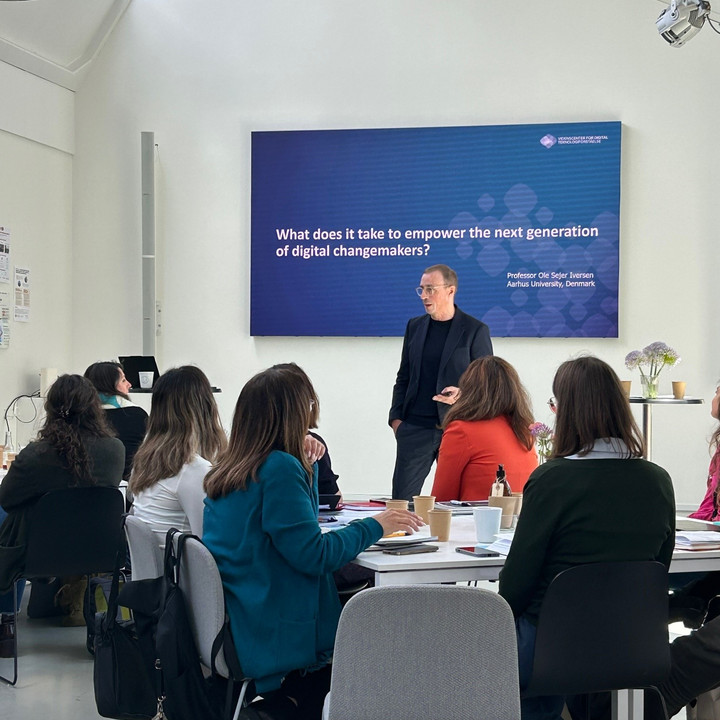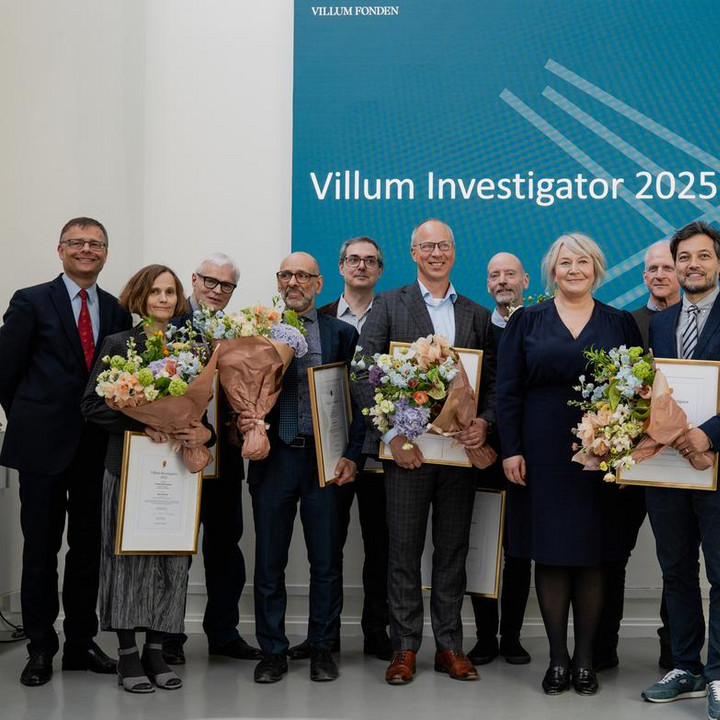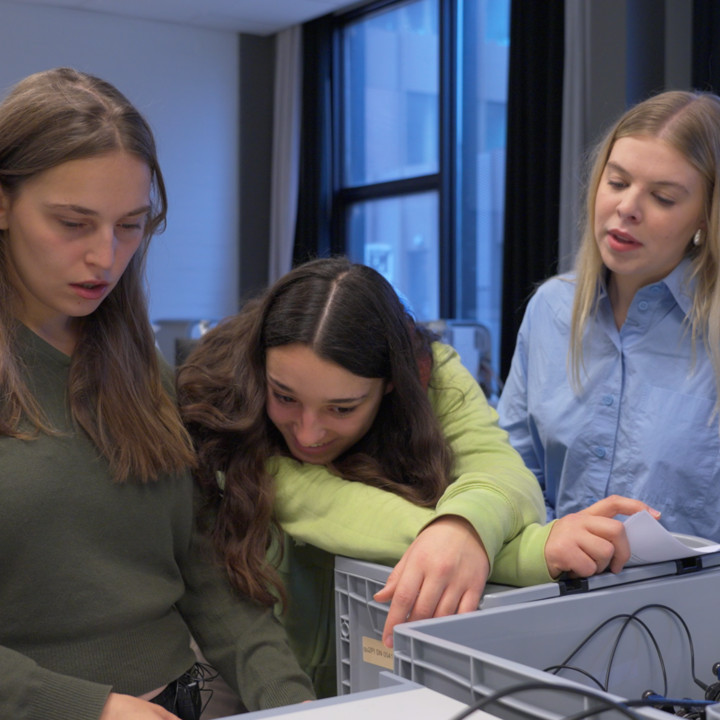Villum Experiment: From Digital Scents to Insects as Raw Material

51 innovative and unconventional research ideas have just received support from the Villum Foundation.
The projects were anonymously evaluated to ensure that the potential of the ideas was prioritized over the researchers' backgrounds—a process that promotes creativity and the courage to take risks.
"The Unexpected and the Untested"
The research ideas span a wide range from scent technology to AI and sustainable biomaterials.
Thomas Bjørnholm, Research Director at the Villum Foundation, explains the idea behind the Villum Experiment Programme, which gives bold research ideas a chance: "Villum Experiment represents the unexpected and the untested. Here, we support researchers who dare to take chances, and we know that some of these projects can lead to groundbreaking discoveries. Our goal is to give space to ideas that can change the world—even if they may seem completely wild at first."
Scents over Distance
One of the projects, for example, investigates how scents can be transmitted over distance—just like we currently transmit sound and images. This could lead to an entirely new form of telecommunication that integrates the sense of smell, allowing us not only to see and hear across distances between devices—but also to smell.
"The project opens the door to research on integrating electronic noses in digital scent emission devices. In the future, this knowledge could be used to add an extra dimension to communication by including scents in addition to sound and images," explains Associate Professor at the Mads Clausen Institute Roana de Oliveira Hansen, who leads the project.
Insects as Biomaterials and Green AI
Another project, INFUSE, explores whether insects can be used as raw material for textiles or packaging. If successful, it will open the possibility of widespread use of insect biomass for entirely new types of biomaterials.
And a third project examines whether we can teach artificial intelligence to code more sustainably, so we can reduce the energy consumption of future AI systems.
"The research ideas challenge the boundaries of what we believe is possible—from scent transmission to the development of green AI. This is precisely the type of bold research we want to promote, as it can pave the way for future major discoveries," says Thomas Bjørnholm.
• Focus on innovative and unconventional research ideas
• Anonymous evaluation ensures focus on the potential of the idea rather than the researcher's merits
• High risk factor and potential for breakthroughs
• Supports research projects in their early stages
• Annually awards approximately 50 grants
Villum Experiment recipients, year 2024
Sofia Ribeiro, senior researcher: Arctic time capsules: resurrecting marine phytoplankton to investigate adaptation to climate change, DKK 1.9 million.
Roana Melina de Oliveira Hansen, associate professor: TeleScent – Long-distance transmission of scents, DKK 1.9 million.
Daniel Garcia Martos, postdoc: NanostuctOPV: Organic semiconductor nanoparticle lattice for organic photovoltaics, DKK 1.9 million.
Ayoub Laghrissi, postdoc: Optical Gears- Harnessing Light's Angular Momentum Towards Nano Optic Omnidirectional Motion, DKK 1.9 million.
Martin Cramer Pedersen, assistant professor: TopoBio: Data-driven Topology of Biological Soft Matter, DKK 1.9 million.
Brian Møller Andersen, professor: Superconducting Altermagnets, DKK 1.8 million.
Tue Hassenkam, associate professor: Dark life, DKK 500.000.
Christa Gall, associate professor: COSMO-BRIDGE Cosmology in a Crisis: Bridging the gap between the cosmic past and future, DKK 1.9 million.
Anders Garm, associate professor: Do animals glow with invisible light?, DKK 1.9 million.
Laura Cotton, postdoc: Unveiling the Ocean's Plastic Time Capsule, DKK 1.9 million.
Ankit Kariryaa, postdoc: Earth-INN: Invertible Neural Networks (INNs) for Accommodating Earth Observation, DKK 1.9 million.
Antoine Lecocq, postdoc: EntoSpace: Insect-Based Food and Recycling for Space Colonization, DKK 1.9 million.
Brian Fredensborg, associate professor: Six-legged cows? Cockroaches unlock the secrets of hydrogenosomes, the culprit of ruminant methane emission, DKK 1.9 million.
Johan Andersen-Ranberg, assistant professor: PERISCOPE – Color change with peridinin carbon excision chemistry, DKK 2 million.
Jacob Agerbo Rasmussen, postdoc: Reprogramming Invertebrate Pests (RIPest): Using phages for by-proxy pest modifications, DKK 1.9 million.
Selina Tisler, assistant professor: PASTOR: Finding the persistency archetypes to stop the biodegradation lottery and move to reliable half-lives, DKK 1.9 million.
Monica Rojas Triana, postdoc: Is Circular DNA Transforming Plant Community Resilience to Environmental Stress?, DKK 1.9 million.
Meike Burow, professor: Do plants and insects utilize similar olfactory mechanisms?, DKK 1.9 million.
Laura Arribas-Hernandez, postdoc: A Plant Physico-Chemical Thermometer, DKK 1.9 million.
Qinying Pan, postdoc: Spatial Regulation of Heteronuclear Metal sites in Nano-porous Photocatalyst for efficient CO2 to C2+ Product conversion, DKK 1.9 million.
Masoud Alizadehshamsabadi, postdoc: Eliminating the need for preheating and post-weld heat treatment of large-scale ductile cast iron components(NoHeatWeld), DKK 1.9 million.
Amit Chanda, postdoc: ETHOS – Efficient Thermal energy harvesting at “empty” Oxide interfaces, DKK 1.9 million.
Adrian Alexander Schiefler, postdoc: Where does all the CO2 go? A 4D investigation at the nanoscale, DKK 1.9 million.
Manuel Pinelo, professor: A Nature-Inspired Novel Technique to Overcome Present Limitations of Enzyme Immobilization, DKK 1. 9 million.
Antonio Grimalt Alemany, postdoc: MicrobesTALK – Talking microbes into biofilms, DKK 1.9 million.
Christopher Røhl Yskes Andersen, postdoc: Direct View to Quantum Dot Prototyping, DKK 1.9 million.
Morten Schiøtt, senior researcher: Leaf-cutting ant inspired biomass conversion using Fenton chemistry, DKK 1.9 million.
Kyveli Kompatsiari, postdoc: Perturbing self-other dynamics in social interactions using two-brain stimulation, DKK 1.9 million.
Jinhyun Chang, assistant professor: Moisture-tolerant, Fluorine-free Electrolytes for Scalable and Sustainable Batteries, DKK 1.9 million.
Tim McGinley, associate professor: GeneBuild: Modelling the genes of buildings to support their scientific analysis, DKK 1.9 million.
Thomas Sand Jespersen, professor: Topological protection in electronic circuits (TOPEL), DKK 1.9 million.
Sanshui Xiao, associate professor: Developing ultrahigh spatial and temporal resolution microscopy to probe quantum features in moiré superlattices, DKK 1.9 million.
Valdemaras Petrosius, postdoc: Peptide barcode enabled lineage tracing with mass spectrometry based single-cell proteomics, DKK 1.9 million.
Trine Bilde, professor: Extraordinary Sex Ratios, DKK 2 million.
Qi Luo, postdoc: Thunder Stone, DKK 1.9 million.
Beatriz Gill Olivas, postdoc: A rocky start – mineral crushing as a precursor to life, DKK 1.8 million.
Kenneth Howard, associate professor: Expanding the Immune Galaxy: Albumin as an Immune Surveillance Molecule, DKK 1.9 million.
Rikke Louise Meyer, associate professor: Z-DNA: The alter ego of DNA in the extracellular space, DKK 1.9 million.
Guillermo Portillo Perez, postdoc: Insect-based NanoFibers for everyday USE (INFUSE), DKK 1.9 million.
Andrei Kalinichev, postdoc: SpectISO: Spectroelectrochemical Integration for Advancing Ion-Selective Optodes, DKK 1.9 milllion.
Laia Civit Pitarch, postdoc: Dynamic molecular imprinted RNAs to decipher cellular landscapes, DKK 1.9 million.
Vaidotas Kisielius, postdoc: Environmental Fate of Novel Antibiotics, DKK 1.9 million.
Andreas Schramm, professor: Implementing Nanopore Adaptive SequencInG for HosT-Associated Microbiomes (INSIGHT), DKK 1.9 million.
Natalia Prieto Vidal, assistant professor: Beta-LPS: Exploiting marine Betaine lipids to design the future LiPoSomes, DKK 1.9 million.
Daria Zharikova, postdoc: Plant epigenome-microbiome interactions are an undiscovered mechanism of adaptation, DKK 1.9 million.
Mikkel Lund, assistant professor: Starlight Through the Lens: A New View on Stellar Oscillations, DKK 1.9 million.
Saghar Hendiani, postdoc: Ecosystem on Chip to Unravel Propagation of Antibiotic Resistance Genes in Soil, DKK 1.9 million.
Andrew Cassidy, postdoc: Molecular motions in frozen water, DKK 1.9 million.
Shuai Zhao, assistant professor: Phy-caliper: Discovering Unknown Physics for Calibrating Predictive Maintenance in Power Electronics, DKK 1.9 million.
Leonid Gurevich, postdoc: NOWOS - Non-Woven Sodium-Ion Batteries, DKK 1.9 million.
Bent Thomsen, professor: Teaching AI green coding, DKK 2 million.



